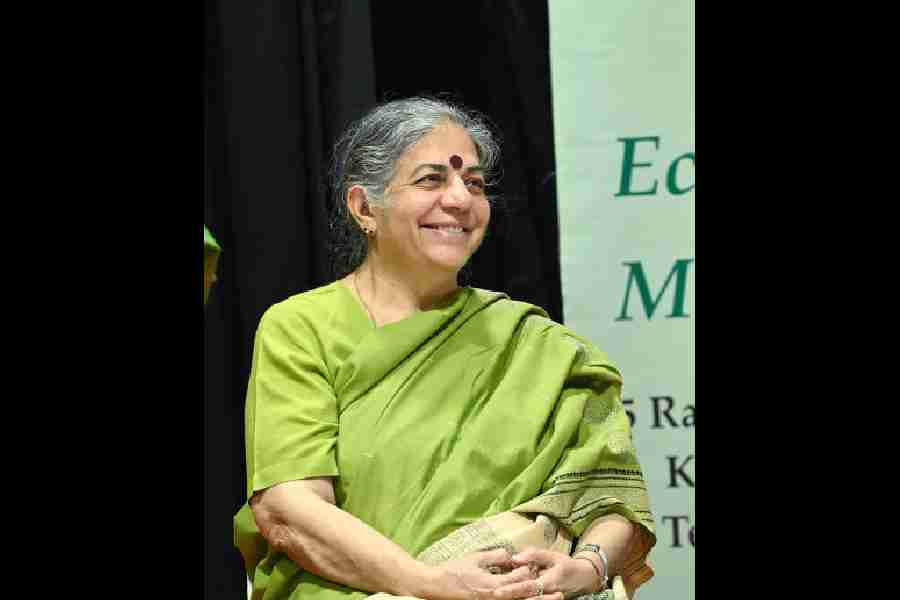She calls herself the defender of nature, so it seems fitting that she be clad in green when we meet. Vandana Shiva, scholar, environment activist, food sovereignty advocate and anti-globalisation author, was in Calcutta to participate in a panel discussion — hosted by the NGO Centre for Ecological Movement — on the receding mangroves in the Sunderbans. A physicist by education — she had a short stint with the Bhabha Atomic Research Centre — Shiva’s biggest contribution is her work to remove US patents on indigenous Indian seeds such as neem, basmati and wheat. She is known for her stance that life forms cannot be patented, something that the 1994 WTO Trade Related Intellectual Property Rights agreement facilitated.
“I challenged the ideas of Monsanto and other such firms that they have invented the seed and they could patent it and force it on our farmers,” she says and points out that this is the fight she is proudest of winning.
Shiva’s organisation, Navdanya, which means nine seeds and also new gift, was one of three that fought a 10-year battle in the European Patent Office against the patent for neem that was granted to the US Department of Agriculture. “In 2000, Monsanto had announced every seed would be theirs. To counter it, we have built 150 community seed banks,” she adds. These collect and preserve heirloom seeds that were losing out as more farmers transition to hybrid high-yield seeds produced by agribusinesses.
Shiva is famous for her anti-GMO stance — she seems to especially dislike Monsanto, which she brings up multiple times in the conversation — and for calling the Green Revolution a failure. GMO stands for genetically modi-fied organisms.
Talk turns to the topic that recently had the land of Green Revolution in India — Punjab and Haryana — up in arms, how the trio of farm laws were eventually repealed. Not laws, ordinances, the activist in Shiva insists because they were pushed through Parliament without a vote. She may have a technical point because the laws needed to be preconditioned by the dismantling of the Essential Commodities Act and the APMC Act, she points out.
It is the proposed dismantling that has got people spooked.
The APMC or Agriculture Produce Marketing Cooperatives Act governs the sale of produce from farmers to small traders at a guaranteed minimum price, decided jointly. It also puts a limit on how much stock a trader can hold. The APMC is much like the Essential Commodities Act which, in its original form, did not allow the hoarding of commodities such as rice, pulses or oilseeds. “You need to be able to hold huge amounts to bring anarchy. That is how the Cargills and Conagras (US agribusiness giants) control the market. That’s where Adani wants to be,” says Shiva, stating her belief that Adani is just a front for Cargill.
It is believed that the Essential Commodities Act was sparked by the Great Bengal Famine of 1943. “Amartya Sen and others have written there wasn’t a lack of rice, it was an excess of exploitation. Dismantling the Act will allow the kind of speculation that brought the famine,” Shiva says.
The third law governs the contracts farmers can have with buyers who may book their produce for a season before it is even sown. “A contract between equals is one thing but a contract when one side is an agribusiness and the other side is a tiny, two-acre farm or a one-acre farm, it’s unequal, asymmetric,” points out Shiva.
She goes on to add that all the contracts she has ever seen have always been about the rights of corporations, never their obligations. The new law didn’t even let the farmer take a corporation to court for breach of contract; the ultimate deciding authority was the district magistrate (DM). “If this political system has brought in a corporation, will the DM ever make a decision against it,” she asks.
The farm laws, since withdrawn, were framed on World Bank conditionalities spelt out in 1991 as part of the debt restructuring passage for the $90 billion India owed. Most of it, says Shiva, was for the Green Revolution in agriculture of the 1960s-70s. She goes on to say how an active Parliament and a strong Opposition kept the laws from being passed, how they could be pushed through as ordinance during the Covid lockdown. “They never passed as law, in a legitimate way.” And they won’t, if the farmers of Punjab have anything to do about it.
Shiva has been working with farmers in Punjab since 1984. She knows the farmer leaders of today. “They are sons of farmers I have worked with for years against neoliberalism. So they have been through 30 years of knowing how the global system works. I translated every World Bank decision and what it enabled 30 years ago. These people know what is coming.”
Parliament passed the three farm bills in September 2020. On 12 January 2021, after months of farmers’ protests, the Supreme Court stayed their implementation. In November, with Uttar Pradesh and Punjab elections around the corner, Prime Minister Modi announced his decision to repeal the laws.
The day after this interview, Shiva is travelling to Gosaba in the Sunderbans to hand over salt-resistant paddy seeds to village women. Any storm can breach the embankments in islands in the Sunderbans, flooding the paddy fields with seawater. Unlike normal paddy, these seeds will thrive even in salt-tainted fields.
A decade ago, a rice scientist in West Bengal had developed salt-resistant paddy seeds in his laboratory. Unfortunately, Shiva-influenced stringent anti-GMO laws meant they were never approved for cultivation.










